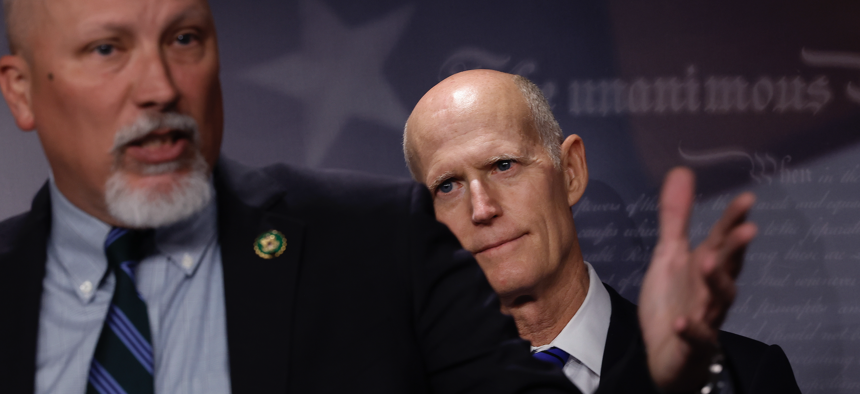Policy
Under Rick Scott bill, federal employees could be fired any time, for any reason
'The public Service Reform Act will boost accountability and responsiveness across the federal government by making all executive branch employees at-will,' Scott said.

House Freedom Caucus member Rep. Chip Roy (R-TX) talks to reporters about the federal debt limit during a news conference hosted by Sen. Rick Scott (R-FL) at the U.S. Capitol on March 22, 2023 in Washington, D.C. Photo by Chip Somodevilla/Getty Images
A group of 14 conservative lawmakers in both chambers of Congress have reintroduced legislation that would make the federal government an at-will employer and abolish the Merit Systems Protection Board, effectively eviscerating federal workers’ civil service protections and chilling whistleblowing.
U.S. Sen. Rick Scott, R-Fla., and U.S. Rep. Chip Roy, R-Texas, are the lead sponsors of the Public Service Reform Act (H.R. 3115), which would make career federal workers at-will employees and get rid of most of the avenues currently available to appeal adverse personnel decisions.
It also would abolish the MSPB and send most appeals directly to federal appellate courts, although it preserves a 14-day window for whistleblowers to allege retaliation before the Office of Special Counsel.
“It’s clear that the bureaucracy of the federal government is both a waste of taxpayer dollars and inefficient,” Scott said in a statement. “Red tape and bloated federal agencies constantly slow down progress and hamper American innovation.
"It’s time to change Washington so it actually works for the American people," he added. "The public Service Reform Act will boost accountability and responsiveness across the federal government by making all executive branch employees at-will.”
“It is far past time to reinstate accountability to the people for the federal bureaucracy by requiring that like any private sector employee, federal workers can be removed from their positions,” Roy added.
“Notwithstanding the majority of federal workers who faithfully serve, especially our law enforcement personnel, we should not allow a wall of red tape to shield those engaged in noncompliance with the law and brazen political partisanship. Federal employees should keep their jobs based on merit, just like the people they serve.”
The bill also allows for federal workers to appeal adverse personnel actions they believe were discriminatory to the Equal Employment Opportunity Commission, although the legislation requires EEOC to scrap its policies relating to the federal workforce and apply private sector rules to the proceedings.
And it creates a disincentive to federal workers filing appeals of their firings through a provision that says that if a court finds a complaint to be “frivolous” or otherwise “brought in bad faith,” the employee’s defined benefit annuity is automatically reduced by 25%.
Roy previously introduced his bill last July, but with Democrats in control of the House, it languished. With a divided Congress, its chance of passage now remains low. But the bill has gained support, with the number of initial cosponsors growing from five to 14.
Between this legislation and other initiatives gaining steam within the Republican party, including a proposed revival of Schedule F, which has already been endorsed by the Heritage Foundation, former President Trump and other likely GOP presidential candidates, it is clear that efforts to upend the federal civil service have become a central plank of the party’s platform.
Related coverage –
- Florida Gov. DeSantis calls for 'cleaning out' federal science agencies
- DeSantis, Trump both favor revival of federal political patronage system
These plans, along with early signs of a push to declare federal employee unions unconstitutional, suggest “truly epic storm clouds” are on the horizon, according to Don Kettl, professor emeritus at the University of Maryland and former dean of its School of Public Policy.
“It’s inconceivable that a major Republican candidate would stake out a position any more favorable to federal employees,” Kettl wrote. “[Conservatives] are offering two tracks for remedies: executive action, especially through a revival of Schedule F; and judicial cases, especially through challenges to the role of public employee unions and, even more fundamentally, to the role of the merit system itself.”
A version of this story was first published by Government Executive.
NEXT STORY: First case scheduled for new Miami-Dade police oversight panel
